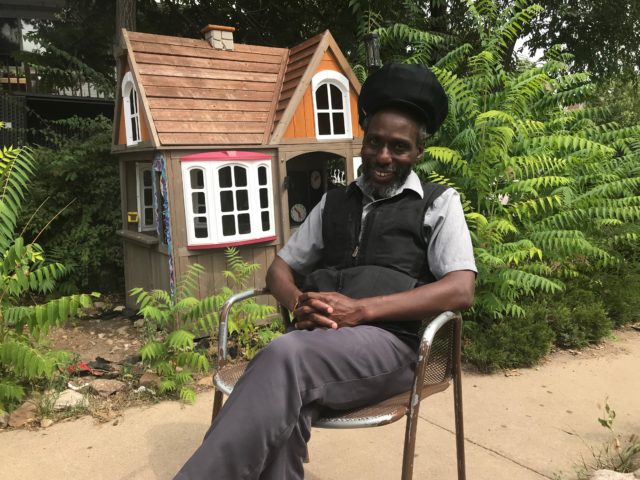
In Swahili, the word ujamaa means “familyhood.” Some translate it as “extended family” or “brotherhood,” but for Tanzanian natives like Robert Oyugi, it’s a concept, a symbol of unity and freedom from the early 1960s after the East African nation gained independence from Britain.
“It’s a philosophy,” Oyugi tells me as we sip drinks outside of Thrive. “If we all come together and work, we can create and develop a strong nation, strong businesses.”
Oyugi is the founder of Boulder’s nearly two-decade-old Soul Rebel Festival, a one-day music and arts fete centering on reggae, Afro-pop, world music and Americana. For 18 years, Oyugi has organized the festival on his own, moving it around the county over the years, though it seems to have found a forever home at Sunshine Acres at Vali Soul Sanctuary in Longmont. Soul Rebel is a labor of love for Oyugi and a physical manifestation of the creative ideals of Ujama News (that’s not a misspelling; there’s only one A), his long-running magazine highlighting African culture, innovation and movements.
Which brings us back to the political concept of ujamaa, with two A’s.
Ujamaa of the 1960s, ’70s and ’80s was a form of African socialism, based on a rural, agricultural way of life. In Tanzania it prioritized the African identity, encouraged cooperation between neighbors, gave women a voice and educated more children. The infant mortality rate dropped, women lived longer and literacy soared.
Yet in a world driven by profits, ujamaa ultimately failed as an economic structure in Tanzania. But the concept imprinted itself on successive generations, particularly on rappers and hip-hop artists in the early ’90s, their songs packed end-to-end with messages promoting unity, equality and family.
The word stuck with Oyugi as well. Ujama News is his personal vision of ujamaa: a world brought together by the culture, art and work flowing from Mother Africa. Soul Rebel, by extension, celebrates not only the music of the African diaspora, but the utopian ideals that birthed the ujamaa movement in East Africa 60 years ago.
Born in Tanzania and raised in Kenya, Oyugi moved to Rye, New York, in the early ’70s when he was in junior high. He was an arty kid, enamored with drafting, mechanical drawing and graphic design — and music. Reggae had just begun to make a global name for itself, and Oyugi, far from home, saw himself in its political messages and syncopated sounds.
“A lot of African countries had just been 10 years into independence from the yoke of colonialism [when reggae became popular,]” he says. “Reggae music — with the rise of Bob Marley, Burning Spear, Culture — was really the voice of independence. Apartheid was going strong in South Africa, Nelson Mandela was incarcerated still. And so as the world began economic embargoes against the government in South Africa, reggae was kind of the voice for the oppressed, a voice for the people.”
He studied architecture for a time in college, but found himself unfulfilled. By the late 1980s, Oyugi made his way to Colorado, where he found a job with Jim Morris Environmental T-Shirt Company, heading up the company’s receiving department and eventually taking on the role of buyer. He learned how to manage a hefty budget, maintain large inventories and work with multiple suppliers; marketable skills no matter the business.
His passion for music and art never waned. He took on graphic design projects when possible (Ujama Designs), and by the mid-’90s he got the chance to start managing and booking North American tours for reggae vocal harmony group The Meditations.
Through the ’90s and into the present, Oyugi has managed and booked a who’s who of reggae artists: The Melodians, The Mighty Diamonds, The Wailing Souls, Bunny Wailer, Cocoa Tea, Half Pint, Black Uhuru, Tanya Stevens… the list goes on and on. He launched a couple of long-running reggae nights in downtown Boulder that served as a sort of development stage for what would become the Soul Rebel Festival.
In 2001, Oyugi presented the first Soul Rebel Festival at the Boulder Bandshell. Since then he hasn’t stopped. The idea has remained the same: keep the festival small, family-friendly, peace-loving and self-sufficient.
“It’s very empowering when you can be self-sufficient,” Oyugi says. “And this goes back to growing up in Africa and learning the whole pan-Africanist ideology, why a lot of African countries have to break the yoke of colonialism to develop self-sufficiency, to develop ourselves. When you stop to look at it, it’s the same thing people call the American dream.”
I wonder aloud if Oyugi feels frustrated by middle-class, white Americans making reggae music, but he reminds me that’s not the way ujamaa works — not his ujama, at least.
“If they heard the music and felt the heart of the music, grew dreadlocks and put it upon themselves to really live the life and get out there and spread the word of peace and love, and fight down oppression and injustice, so let it be. We need more people like that in the world.”
ON THE BILL: The 18th Annual Soul Rebel Festival — with Pato Banton, Mono Verde, Selassie, John McKay Band and more. 2 p.m. Sunshine Acres, 6717 Valmont Road, Boulder.














